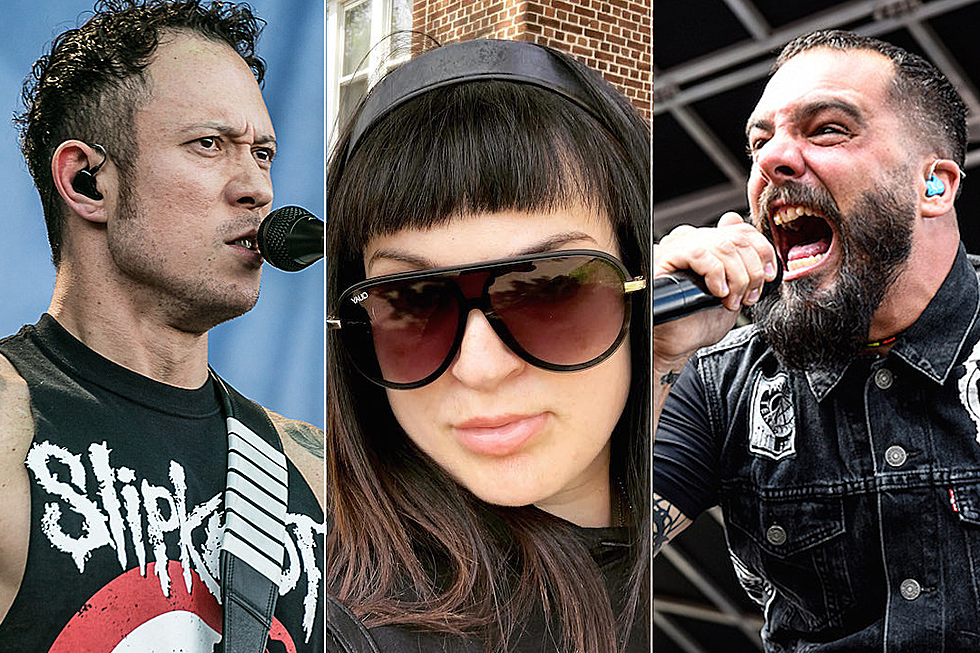
How Amy Sciarretto Went From Intern to Influential Metal Publicist
Meet publicist Amy Sciarretto of AtomSplitter PR.
Sciarretto got her start in the music industry as an intern (which she parlayed into a part-time job) at FMQB, a radio trade magazine that focused on commercial radio. From there, she joined College Music Journal as an editorial assistant writing reviews, coding for the website and writing news and quickly took ownership over the "Loud Rock" section.
In 2000, Roadrunner Records scouted her with hopes of her joining their ranks in the press department. Sciarretto declined this position, but two other spots at the label opened up a year later, and she ultimately joined Roadrunner working in the radio department with both commercial and college stations to drive new releases from artists such as Slipknot, Fear Factory, Killswitch Engage and others.
Breaking away from Roadrunner, Sciarretto started her own publicity firm, representing bands from labels such as Fearless Records (August Burns Red, I Prevail, Starset, Underoath), Spinefarm Records (Atreyu, Bullet for My Valentine, Venom, While She Sleeps, Within Temptation), earMUSIC (Alice Cooper Tarja Turunen Hollywood Vampires), Rise Records (Blessthefall, Cane Hill, Of Mice & Men, The Devil Wears Prada) and others as well as individual artists such as Killswitch Engage, Machine Head, Trivium, Hatebreed and a lot more.
She even co-authored a book with Rick Florino, titled Do The Devil's Work for Him. How to Make It In the Music Industry (And Stay In It!), which you can purchase here.
For those aspiring for a career in the music industry, read what it takes to be a publicist straight from Amy Sciarretto.
What's the biggest band you had a hand in breaking?
Slipknot was already taking off, but I was also one of the first people to cover them quite extensively as a writer on a national level. So, Roadrunner gave me a platinum record for that.
Their first No. 1 record, I worked that. Their first sold out MSG show, I worked that. When Paul Gray passed away, I was the representative of the company, not the publicist, who was sent to Iowa to support, comfort and work for the band. Whatever they needed done on behalf of Roadrunner, that was my job for two days, and I was happy to do it because they were like my family.
I remember Wayne Pighini, someone who I respect a lot in the music industry, told me once, when I was leaving CMJ to take the job at Roadrunner he said, "When you see on the other side what it's like to watch a band break and you want to run to your desk everyday to see what that SoundScan is in the morning or to see what those radio numbers are or that new press clip."
And he was right.
You got sent all over the country to assist Roadrunner artists with really anything they needed at places like Ozzfest. Is that where you realized that you wanted a career in publicity?
"I loved doing all that stuff. A lot of times there's a meet and greet on the schedule, and the bands have busy schedules and it was my job to make sure it just got done — through any means necessary. I was always the liaison"
There were times I'd be running Zakk Wylde's guitars to the cars up and down with the venue that Ozzfest was at in Wisconsin. It was like a ski lodge type of thing. I used to run up and down hills, getting his guitar to him, getting him to sign it, taking it back to the radio station — stuff like that.
You've also worked with Killswitch Engage for just about their entire career.
When we saw what was happening with Killswitch Engage on The End of Heartache, after building everything we did with Alive or Just Breathing and then with Howard Jones replacing Jesse Leach... We had these meetings with some of the higher up executives at Roadrunner and they would tell us, "With KSE you guys are doing really good but we're not giving them a radio campaign until we sell 125,000 records." I remember they'd say that stuff to us and I'd be like, "Are they challenging me to go out and sell more records? I'm going to go to my desk and we're going to sell 175,000."
What was your reaction when learning that Howard was going to be leaving Killswitch Engage?
We knew stuff was going on with Howard, and we knew things were changing. When he eventually said he was leaving, he had to go take care of himself and take care of his things. I was bummed because I worked with him for many, many years and loved working with him.
I was hoping it was Jesse who was going to be his replacement because it just felt like it should be Jesse.
So it wasn't an immediate decision to bring back Jesse?
It was not. I worked Times of Grace (Jesse and Adam Dutkiewicz), so they still had that chemistry. I worked with Jesse all those years after he left KSE because he was just an amazing person, but it wasn't a done deal at first. Most people who were on the ground level with the band knew that was where it was going to go.
You've repped seemingly every metalcore band in existence. How did you wind up as this sort of go-to publicist for the genre?
I had left Roadrunner and then I started my own thing. Killswitch was the first band that said, "Hey, well, if you're leaving Roadrunner, don't leave us."
I was trying to figure out what I was gonna do next. I was like, "Am I gonna stay in press?" And like that choice was made for me because I started with Killswitch and then other bands that I worked with at Roadrunner came to me.
Then Mike Milford, who worked at Artery, and was managing Attila, was like, "Hey, I really need you to do Attila. I need somebody to turn the message on this band around." And then it just spiraled from there. Then it was like, "Okay, we need you on all the Artery recording stuff. Then we need you on Chelsea Grin." Then In Flames came to me. It just kind of spiraled from there.
For years, Atilla used to get the worst press there was, and we started out getting really bad press on small outlets. Then we started getting really bad press on metal outlets. Then things started turning around when we started getting really good press in big outlets because the press everywhere else was so bad that the big outlets were like, is this band this bad? They would write think-pieces or they would take the counter-argument.
Then it became a thing where we would get good press in big outlets, then we started getting good press in the metal and smaller outlets that were always giving us bad press. It was interesting how we turned that around. I would say that all that bad press was good press because it built a story and it built a profile.
What was the biggest blindside you've had as a publicist?
I'll never forget when Mike Portnoy left Dream Theater. I was at home. I was sitting in front of my TV, and I checked my email and I got the press release that he sent out saying that he was leaving the band. I forwarded it to my bosses and I went, "Wow, this is a bombshell." My boss hit me back with, "Have fun tonight!," because I literally spent the entire night getting responses from all over because Dream Theater was such a press-friendly band.
Any time you have a member of your band that you work with and that you have a professional/personal relationship with pass away — I've had that happen several times and it's never a cut/paste way of dealing with it. It's always very painful. You also have to say the right things to the media. You have to protect the person's family and their image and their memory and their legacy and you have to put your feelings aside for that. You have to put aside how you feel and how crushed you might be to have lost someone that you care about. You have to put on your game face and be professional.
You mentioned getting different tiers of press or getting different looks... rejection is also a big part of publicity. How do you know when to push something and went to cave and say, "I'll get them next time with something else."
I have friends who work in the lifestyle PR world with products and they'll always tell me that they're bosses are like, "Just get the no. Keep emailing until you get the no."
I don't like to adopt that approach, because I feel like you don't want to annoy somebody or be a punisher. Then you ruin your relationship with them. You can kind of get creative, but you can tell if it's a hard no or not.
If you think that you're really close or maybe there was a part of your pitch that didn't quite resonate, you can always come back and say, "Hey, well, what about this?" In the TV booking world, you send them stats and you check in. You say, "Hey, I have this band." If they say, "Hey, thanks for thinking of us, but this isn't a fit for us." That's fine. You can say, "Well, in the future, if the band has this or this, I'll keep you informed," and they're always open to that. It's always good to keep the relationship open and respect the boundaries.
My relationship with the media is about a dialogue. I'd like to think that a good percentage of the writers, and editors, and bookers and producers that I work with, we have that nice back and forth, where we could talk to each other.
As a publicist taking on so much different stuff, naturally there's gotta be some music that you're not personally into. What can you say about separating your work and personal taste in trying to get excited about a band?
I always tell the people who work with me, "You're not going to love every single thing that you work. It's not about what you love. It's about taking a record, or a song, or a video, or a release and going, 'Okay, this got signed. It got made, and this band has fans. Why is this going to appeal to somebody, and how do we get it in front of the right eyes?'"
Even if I might not have loved their music, I learned to love it and I learned to love the people. To me, that's even more important because I see, with a label, what the vision is and what the manager is trying to achieve. Sometimes, that may be even more exciting than the music itself.
50 Most Important Metal Bands in the 21st Century
More From WGBF-FM










